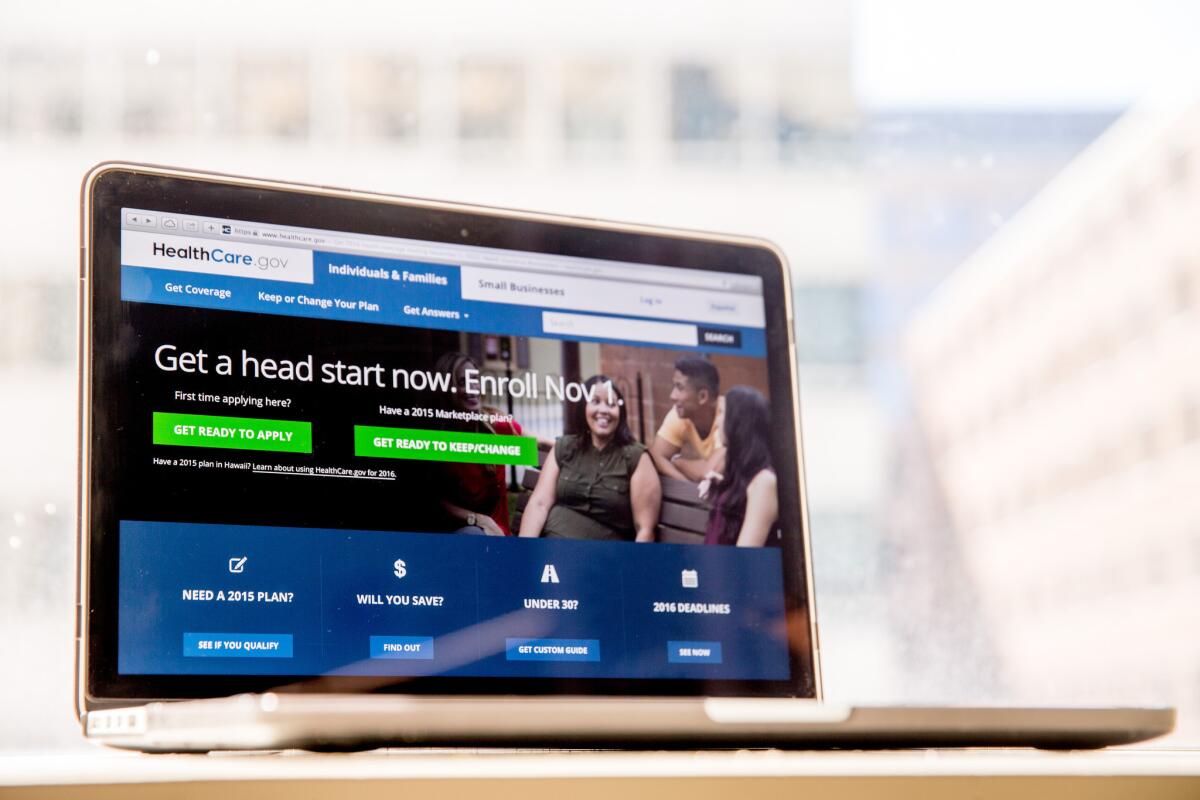Most Obamacare enrollees are satisfied with coverage, but worries over costs are rising

- Share via
Reporting from Washington — Most Americans enrolled in health plans through the Affordable Care Act are happy with their coverage, despite persistent attacks on the health law by Republicans, including presumptive presidential nominee Donald Trump.
But consumers are increasingly concerned about their monthly premiums and deductibles, reflecting rising anxiety among all Americans about their medical and insurance bills, a new national survey found.
Nearly 6 in 10 working-age Americans who have a health plan through one of the marketplaces created by the law said they are satisfied with their monthly premiums, and just over half say they are satisfied with their deductibles.
That is a pronounced decline from previous years. In 2014, the year the marketplaces opened, nearly 7 in 10 consumers said they were satisfied with their premiums, and 59% said they were satisfied with their deductibles.
“These are important signals to track to identify potential gaps in consumer understanding of how their plans work and the adequacy and transparency of coverage,” conclude the authors of the survey by the nonprofit Kaiser Family Foundation.
“These trends also could affect the potential for marketplaces to attract new enrollees — particularly people who are currently healthy — and (to) retain existing consumers.”
The law, commonly called Obamacare, allows Americans who don’t get health benefits at work to shop among plans on state-based marketplaces operated by the federal government or by the states themselves.
Consumers making less than four times the federal poverty level — about $47,000 for a single adult or $97,000 for a family of four — qualify for subsidies. And insurers must provide a basic set of benefits and cannot turn away consumers, even if they are sick.
Enrollment in the marketplaces has been increasing, but at a slower rate than initially forecast; there are about 12 million people in a marketplace plan.
And many insurers are seeking significant premium increases next year, in part because enrollees are sicker and more expensive than they anticipated.
The warnings are fueling a new round of attacks on the health law by critics who say the marketplaces aren’t sustainable and should be repealed.
The new Kaiser survey suggests that some of the criticism is overblown.
While Americans who get a health plan through an employer — the dominant form of health insurance in the U.S. — are happier with their coverage, consumers in the marketplaces remain generally satisfied.
Two-thirds of people with marketplace plans rated their coverage “excellent” or “good” in 2016.
By comparison, more than three-quarters of people with employer-based coverage said their coverage was “excellent” or “good.”
Additionally, despite much media coverage of health plans that are narrowing their networks to exclude more hospitals and physicians, large majorities said they were satisfied with their choice of providers.
But the increasing prevalence of high-deductible plans that require consumers to pay thousands of dollars out of pocket for their medical care before coverage kicks in is fueling mounting consumer anxiety, as is the case with employer-provided coverage.
Just a third of people in a high-deductible plan that they purchased themselves through a marketplace or directly said they have benefited from the health law.
In contrast, more than half of consumers in lower-deductible plans said they have benefited.
The Kaiser survey was conducted between Feb. 9 through March 26, among a nationally representative random sample of 786 adults ages 18-64 who purchase their own insurance, including 512 with marketplace plans.
The margin of sampling error is plus or minus 5 percentage points for those in marketplace plans, and higher for subgroups.
ALSO:
As Republicans look for an Obamacare replacement, two GOP lawmakers make their own bid
Congress moves to fund Zika response, but experts say it’s not enough
Zika’s coming, and there’s not enough money for another health emergency
Twitter: @noamlevey
More to Read
Sign up for Essential California
The most important California stories and recommendations in your inbox every morning.
You may occasionally receive promotional content from the Los Angeles Times.














